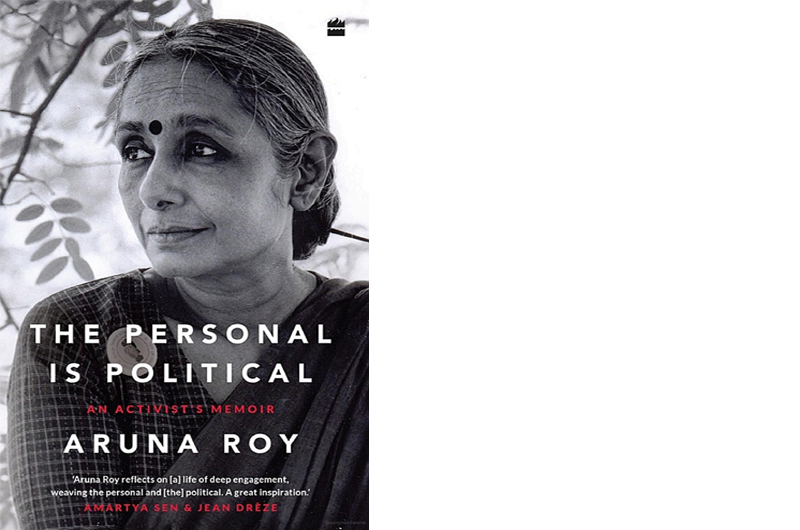The book reminds us as much of some great achievements as of the bigger challenges ahead, says Bharat Dogra
Aruna Roy’s book, titled The Personal is Political –An Activist’s Memoir, published by Harper Collins, has attracted a lot of attention within a short time, partly because of what Amartya Sen and Jean Dreze say about it: “Aruna Roy reflects on a life of deep engagement, weaving the personal and the political. A great inspiration.”
For most people, Aruna Roy is a highly inspiring social activist who has been involved with some of the most successful social campaigns in India, leading to the formulation of very important legislations that have impacted the life of millions of people in very positive ways. However, as her fellow-travelers and closest colleagues on the path of activism – Shankar Singh and Nikhil Dey – say in their afterword, to call Aruna just an ‘activist’ “would be to pigeonhole her in ways that are unfair to what she is: a person with such a wide array of interests, skills and knowledge that draws a natural and original continuum between the personal and the political; the private and the public; the internal and the external; the home and the world; the small and the big…It is Aruna’s careful attention to the smallest detail that prepares the ground for the big breakthroughs that we have been privileged to experience together.”
Nikhil Dey and Shankar Singh are themselves great activists with many accomplishments, and this is what they have to say about this book: “This is a serious book, about serious issues, in serious times. Like Aruna, it does not shy away from raising uncomfortable questions, facing them squarely and understanding that answers are nuanced with shades of grey. That’s what makes the book even more interesting and valuable.” We may add here that while this book certainly deals with very serious issues in serious ways, it is not without its share of very interesting, at times even funny anecdotes which enliven the pages.
The memoir has a foreword by Gopalkrishna Gandhi. The book moves at two levels. On the one hand, we read about the experiences of Aruna while resigning from a senior government job to work in a voluntary organisation (the Barefoot College or SWRC/ Social Work and Research Centre) founded by her husband Bunker Roy at a very young age, followed by her experiences in a non-party political organisation (MKSS/ Mazdoor Kisan Shakti Sangathan) and then the School for Democracy. This includes the very valuable experiences of the Right to Information, the Right to Work and the Right to Food movements. In addition, we come to know about her important work on gender issues and the highly creative but lesser-known crafts-related work and other engagements with art and music.
On the other hand, in this book we find Aruna’s thoughtful comments on a wide array of topics, ranging from oral history and literature to feminism and various aspects of democracy, including decentralisation. A third and very interesting aspect relates to her description of and tributes to her colleagues, particularly women from poorer rural families, with whom she worked in several social movements and to some of whom she refers to as her mentors.
When I was covering the MKSS movements in Rajasthan as a journalist, what I found particularly inspiring was the way in which the grassroots struggles were linked to national level initiatives. I wish Aruna Roy had written more about this. Also, I would have liked to hear her views on some of the most serious threats at the global level, about peace and war, about the many-sided environmental crisis and all that is together becoming the survival crisis, the most serious issue of our times.
It is deeply troubling that the world leadership has been moving away from this issue. A very senior activist like Aruna Roy with her deep commitment to justice and democracy can contribute much in this context, and her comments on such issues of urgency would have been very useful. We will let Nikhil and Shankar have the last word in this review, as in their ‘afterword’ – “We feel, quite strongly, that this is a book that will spread hope far beyond its own context and times.”
(The writer is a senior freelance journalist and author who has been associated with several social movements and initiatives. He lives in Delhi.)



 from Webdoux
from Webdoux